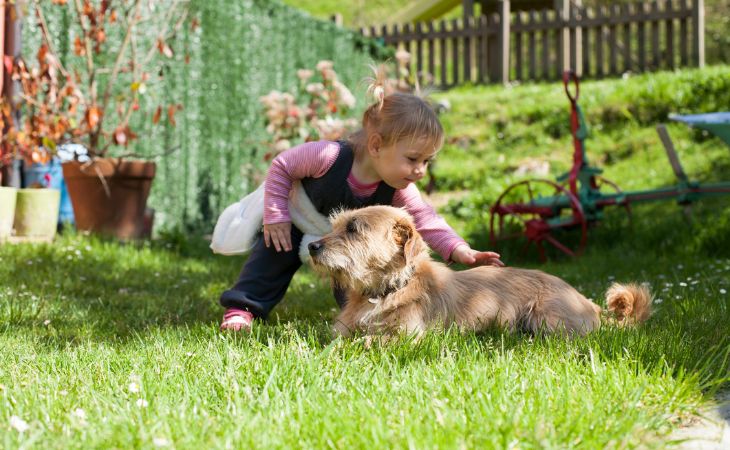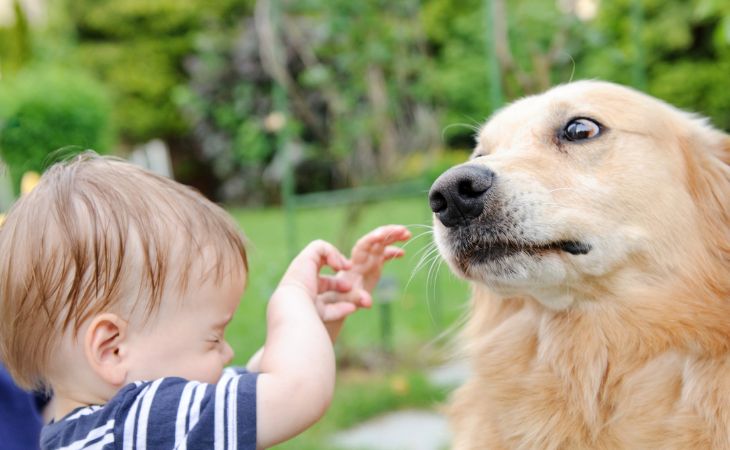While it’s often said that dogs are man’s best friend, this is not always the case. Sometimes dogs do not get along very well with humans. For example, some dogs are afraid of children.
You might notice that your dog is afraid of children if they tend to run away when they see them, behave strangely around them, or bite them. Helping your dog overcome this fear will not only ensure that your dog lives happily, but also keep the children around them safe!
In this article, we’ll explain why some dogs fear children and provide you with a few tips to help your pet overcome their fear.
Why is my dog afraid of children?
Understanding the origin of your dog’s fear is key to helping them overcome it. Dogs do not fear children for no reason!
Children aren’t always gentle
Children aren’t always gentle or calm—they shout, they can be rough, they can hurt a dog by accident. This type of behavior can have a lasting effect on dogs.
When a child bumps into a dog, tries to pet them at all costs, or tries to play with them while they are sleeping, a dog can see this as a type of aggression. Some children can even be purposefully violent—pulling on a dog’s tail or ears, pushing them, or even punching them! If a child were to do the same to you, you wouldn’t be happy either!
Before dealing with your dog’s fear, it’s important to inform the children around you that it isn’t right to treat a dog in this way. You also need to be careful of children when spending time outdoors. Let them know that dogs are not toys.
While many children are respectful towards animals, it’s not always the case. Some of the kindest children can inadvertently scare a dog.
Your dog hasn’t been sufficiently socialized
When they are still puppies, dogs need to be trained and educated. This early training teaches them how to react to the different things they encounter in life. These first few months are dedicated to training, new discoveries, learning how to socialize with other animals, and learning how to socialize with humans. It is necessary for dogs to encounter children during this period.
If your dog has never encountered a child, they might not know how to react when they see one. They might even assume that a child is a potentially aggressive animal.
A negative experience
Your dog might fear children because of a negative experience. They might have been aggressed by one in the past and associate these violent acts with a negative idea—every person that is small is mean.
This might be anchored in them and their fear might be more or less serious depending on the aggression that they were victim of.
If a negative experience is the source of your dog’s fear, they will start to stress out when they see children. If the child gets too close, they can consider this confrontation to be an attack. Because of this, they might bite, not knowing how to defend themself otherwise. Depending on the size of your dog and the child, this can be more or less serious.
The fear might appear later on
While your dog might have really appreciated children in the past, their behavior might start to change as they get older. This is often the case if your dog is in pain. Imagine you have joint pain and someone comes up and shakes you. Or, imagine you have horrible jaw pain and someone comes up and punches you there. It would be awful! Well, it’s the same for dogs. If they are in pain, they could react violently depending on the amount of pain they are in.
How do dogs that fear children act around them?
Depending on the dog’s personality, they can have different reactions when faced with a scary situation. For example, they can run away when a child gets close to them. Because of this, when going out for walks where children might be present, keep your dog on a leash. This will prevent your dog from running away and getting lost.
They might also search for a way to protect themself by hiding behind the legs of their owner. If your dog does this, get your dog away from the situation as quickly as possible.
However, not all dogs try to run away or hide. Some start to growl when they are afraid. No matter the size of the dog, this behavior is potentially dangerous and should be handled as quickly as possible.

What should I do if my dog has a fear of children?
You can either try to help your dog overcome their fear yourself or seek help from a professional trainer. This usually depends on the severity of your dog’s fear.
Get your dog used to children as soon as possible
We already mentioned that dogs that are not correctly socialized can develop fears when faced with children. If you teach your dog how to interact with children from a young age, they will have an easier time when faced with them in the future. If you’ve never had a child spend time at your house, don’t hesitate walking your dog close to a park so that they can get used to the shouts of children. Play with your dog to show them that these shouts do not mean danger.
You can also have your dog meet kind and calm children. Most of the time, puppies do not fear children and actually want to play with them. If your dog spends some time with children, make sure that your puppy’s time stays pleasant. Keep an eye on both your dog and the children. When you see that your dog has had enough, leave with them. They will be able to remember that little ones are fun and kind.
With your own children
When a dog shares a house with young children, they cannot leave when they’ve had enough. It is, therefore, important to teach your children that animals are living beings and if they leave, it means that they no longer want to play. It is pointless to run after them and bother them. Your children need to respect your dog’s space.
You should also discourage your children from waking up your dog when they are sleeping, bothering them when they are eating, or taking their toys. Teach the members of your family this as quickly as possible.
What can be done to lessen my dog’s fear of children?
If your dog has gone through trauma from a child or hasn’t learned how to live with them well, they will be scared. You will need to be very patient with them.
Fear is something that is deeply anchored in us and cannot disappear with the snap of a finger.
For example, think about what terrifies you. Do you think that a few hours will suffice to get rid of this fear? Patience is necessary!
Most importantly, do not force your dog to spend time with children if they are scared. Tell the children you see to not touch them and continue on as if nothing had happened. Your dog needs to assimilate seeing children with an event like any other—without danger.
You can also help your dog by rewarding them with treats. If they saw a child without running away or showing signs of aggressiveness, congratulate them and give them a treat as a reward. Your dog will associate this meeting with happiness.
Most importantly, do not punish your dog if they are stressed when faced with children. This will only reinforce their fear.
An encounter under close surveillance
You can then organize a meeting that brings them even closer. This step should not be taken too early, otherwise you’ll spoil any progress your dog might have made. Again, use positive reinforcement such as treats to help you, and choose a calm, dog-loving child for this.
Because your dog has associated little ones with treats, take advantage! When you find a child that can spend time with your dog, give them a few treats to give to your dog. This must always be done under close surveillance. It is important to react quickly if you start to notice any signs of stress.
Tell the child to hold out their hand gently towards the dog and to present some of their favorite treats. However, do not force them. This will come with time. Try to do this often. Your dog will see that the child didn’t do anything and that they can bring them treats when they want it. When your dog understands that nothing unpleasant happens when they see a child, they will relax and maybe even want to get closer to them.
Is your dog still afraid of children?
Not all is lost! You can seek the help of a dog trainer if you are struggling to help your dog overcome their fear. They will be able to desensitize them gently and allow your dog to feel better around children. With that being said, this can take time. Your dog trainer might suggest seeing a dog psychologist if your dog’s fear of children is too intense.
Do not hesitate to ask for tips to help your dog continue to make progress between sessions.
This article might also interest you: The most common dog fears

